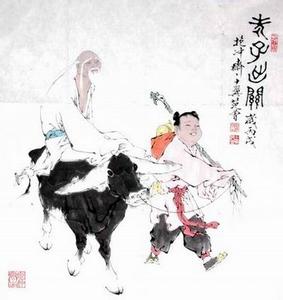(单词翻译:单击)
Taoism in the Per-Qin Period
先秦的道家思想
Taoism, also known as Daoism, was founded by Lao Zi in the Pre-Qin Period, and developed into many schools, the most important of which were represented by Zhuang Zi and Huang-Lao (short for Huangdi and Lao Zi) respectively.
道家学派在先秦时期由老子创立,后发展成为多种学派,其中最具代表性的分别是庄子和黄老(黄帝和老子的简称)。
Guo Moruo (1892—1978), a famous historian, pointed out in his book Ten Criticisms that all Taoist schools regarded Too or Dao, meaning “ The Way”, as the noumenon of the cosmos.
著名历史学家郭沫若(1892——1978)在他的著作《十批判书》中指出“道”的意思是宇宙的本体。
This means Taoism comes from the word dao, and the thoughts on dao constitute the core of the Taoist philosophy.
这说明道家来源于“道”这个词,“道”的思想构成了道家哲学的核心。

Tao, which refers to the integration of the noumenon and rules of the cosmos, is characterized by its deep abstraction and universal significance.
道,代表宇宙本体和法则的统一,高度的抽象性与普遍意义是它的特点。
Because of all this, Taoism is a doctrine, dwelling on the past and the present, covering Heaven and Man, and renowned for its tolerance and plasticity.
正因如此,道家思想是一个立足于过去与现在的教义,它涵盖了上天与人类,因它的包容性与可塑性而闻名。
As a result, more and more schools came into existence, which became an important source of ancient Chinese thinking.
所以,越来越多的学派出现了,它们是古代中国思想的一个重要来源。


